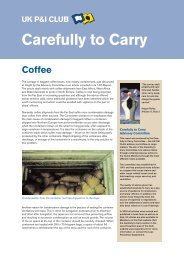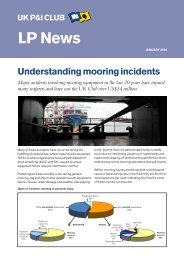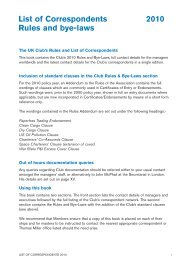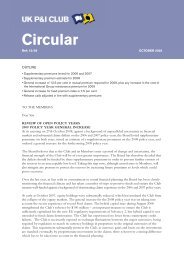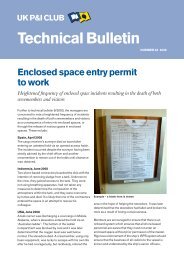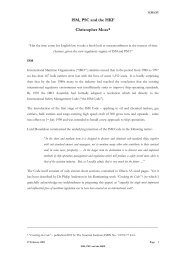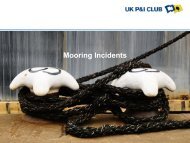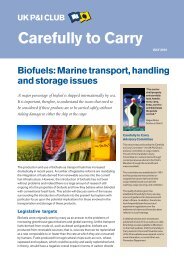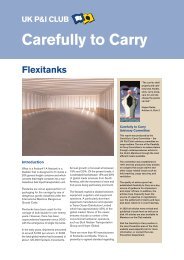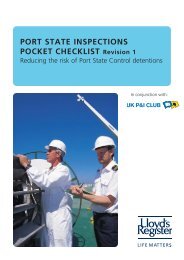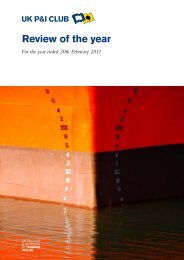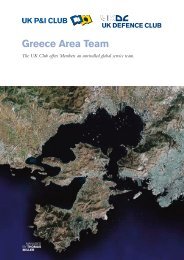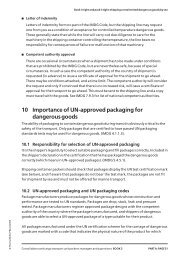Signum2011 web - UK P&I
Signum2011 web - UK P&I
Signum2011 web - UK P&I
Create successful ePaper yourself
Turn your PDF publications into a flip-book with our unique Google optimized e-Paper software.
Specialised detection<br />
- a unique organisation, pursuing criminal investigations for our Members
Making Contact<br />
The two Signum investigators, Chris Simpson and<br />
Mike Carroll can be contacted for advice on their<br />
direct lines, mobile telephones, or at their e-mail<br />
addresses. Their’ administrator, Debra Little is also<br />
available in assisting to contact the investigators.<br />
Chris Simpson<br />
Mike Carroll<br />
direct line: +44(0) 20 7204 2258<br />
mobile: +44(0) 7860 202028<br />
email: chris.simpson@thomasmiller.com<br />
Chris joined Signum Services in 1997 following a 30<br />
year career as a detective with London’s Metropolitan<br />
Police where he served on the flying squad, regional<br />
crime squad and fraud squad. He specialised in<br />
serious and organised crime.<br />
direct line: +44(0) 20 7204 2257<br />
mobile: +44(0) 7785 722 422<br />
email: michael.carroll@thomasmiller.com<br />
Mike Carroll joined Signum Services on retiring from<br />
the Metropolitan Police in November 2006. He was<br />
a career detective for 30 years, serving in various<br />
departments at New Scotland Yard. He specialised in<br />
serious and organised crime, including the investigation<br />
of armed robberies.<br />
Debra Little<br />
The main Signum contact details are<br />
Signum Services Limited<br />
Tel: +44 207 283 5616<br />
Fax: +44 207 626 8379<br />
Email: signum@thomasmiller.com<br />
direct line: +44(0) 20 7204 2256<br />
email debra.little@thomasmiller.com<br />
Debra has been with Signum Services since 2003<br />
and provides administrative support. Debra also is<br />
the contact person between security seal manufacturers,<br />
the <strong>UK</strong> Security Seal Teship Authority and <strong>UK</strong><br />
Customs.
The investigative arm<br />
Signum Services Ltd is the investigative arm of<br />
Thomas Miller & Co. Ltd and conducts investigations<br />
on behalf of the Members of the <strong>UK</strong> P&I Club.<br />
Its origins can be traced back to1953, when food<br />
was still being rationed in the <strong>UK</strong> after World War<br />
II. Thieves had been targeting food supplies being<br />
discharged at London’s docks and thefts of these<br />
cargoes had become a major problem for some of<br />
the P&I Club’s Members. An ex-police officer was<br />
employed to counter these activities.<br />
Signum Services now has two investigators who<br />
travel the world making inquiries into any criminal<br />
activity affecting Club Members. The investigators<br />
are ex-senior detectives from the Criminal Investigation<br />
Department at New Scotland Yard.<br />
They have over 75 years experience in solving<br />
crime and have served on squads specialised in<br />
detecting suspicious deaths, organised crime,<br />
armed robbery, hijacking, kidnapping, fraud and<br />
transport crime.<br />
Their qualifications enable them to enquire into any<br />
incident which a Member may suspect harbours a<br />
criminal aspect. They have been called upon to<br />
investigate murder, arson, many types of fraud,<br />
rape, stowaway related problems, criminal damage,<br />
container and general cargo crime, port organised<br />
crime and every conceivable type of theft.<br />
Signum Services is a unique body in the world of<br />
marine loss investigation.<br />
A typical investigation<br />
professional bodies of which he is a member. All<br />
this may give a fair indication of where the problem<br />
lies before he boards a plane.<br />
Arrangements will be made to interview everyone<br />
involved in the handling or movement of the cargo<br />
in the place where it is believed to have gone<br />
missing. Local agents or correspondents provide<br />
office facilities and the investigator will work closely<br />
with them perhaps for the next week or two. He<br />
may have to work with the state, town or perhaps<br />
the local port police or customs and exise offcers.<br />
The initial request for help usually comes to Signum<br />
from one of the Club’s executives. The problem is<br />
identified and relevant documents are studied. A<br />
high value container or its cargo may have gone<br />
missing somewhere along its six or seven thousand<br />
mile journey across the world.<br />
Preliminary enquiries may be made through the Club’s<br />
network of correspondents or with the Member’s<br />
local agent. The investigator may contact law<br />
enforcement colleagues from one of the international<br />
The investigator must be sensitive to the interests<br />
of the Member. For example, if an investigation at a<br />
port involves common problems experienced by<br />
different Members, each Member is treated as a<br />
separate client and the confidentiality of their<br />
interests is respected accordingly.<br />
With hard work the investigator will return home<br />
having solved the problem. He will then prepare a<br />
detailed report. The cause of the problems will be<br />
explained to the Member and he will be advised of<br />
preventative action which should be taken to avoid<br />
recurrence.
Rags to riches<br />
A shipper arranged transport for two containers<br />
stuffed with cigarettes. At the port of destination they<br />
were stored, unopened, in the terminal for several weeks.<br />
In due course, the consignee requested that they be<br />
returned to the shipper. When the containers arrived<br />
back at the original port of loading only one contained<br />
cigarettes. The other contained rags and old clothing.<br />
The loss was valued at US$250,000.<br />
The Signum investigation showed that terminal staff<br />
had switched the numbers of two containers, one<br />
containing cigarettes and the other containing rags,<br />
whilst stored at the original port of discharge. The<br />
rags container was given the identity of one of the<br />
cigarette units, which in turn received the identity of<br />
the rags container. The consignee of the rags container<br />
then took delivery of the cigarettes exactly as the<br />
thieves had planned.<br />
It also established beyond doubt that the carrier, when<br />
instructed to return the containers to the original<br />
shipper, shipped one container of cigarettes and one<br />
of rags. It was therefore shown that the loss was the<br />
responsibility of the terminal and no claim was ever<br />
submitted against the carrier.<br />
Bar code blues<br />
The consignee of two containers stuffed with cigarettes<br />
arranged for surveyors to ensure that the consignment<br />
should bear particular bar coding. When the cigarettes<br />
were delivered to the consignee, the bar code<br />
suggested a lower grade of cigarette than that ordered.<br />
The Signum investigation revealed that an intermediary<br />
was arranging shipments in the knowledge that the<br />
cigarettes actually supplied by him were of a lower<br />
quality than those ordered. He nevertheless invoiced<br />
his client based on the value of the superior product.<br />
Responsibility for the fraud was shown to be that of<br />
the intermediary.<br />
Copper value reaches ‘rock bottom’<br />
Two separate claims were received by a large Japanese<br />
shipping line for the combined loss of over 1000 tonnes<br />
of copper cathodes valued at about US $8 million.<br />
A total of 53 containers had been shipped from Dar es<br />
Salaam to the two consignees, one in the USA and<br />
one in Korea. When they arrived they were found to<br />
contain worthless rocks and earth.<br />
Signum Services conducted enquiries in Canada, USA,<br />
Korea, Singapore and Dar es Salaam. The shipper in<br />
Dar es Salaam was claiming that the copper had been<br />
stolen during the journey. The investigation clearly<br />
showed that the consignees were acting completely<br />
honestly and there was no possibility of the copper<br />
having been removed anywhere en route.<br />
Further investigations in Dar es Salaam showed that<br />
the surveyors conducting one of the pre-shipment<br />
surveys had been bribed and the other pre-shipment<br />
survey was a forgery. Signum then managed to locate<br />
the place where the containers were stuffed and found<br />
members of staff who recalled loading the container<br />
five months earlier, not with copper cathodes, but with<br />
rocks and earth. One of them had been suspicious at<br />
the time and had decided to take some photographs.<br />
Signum took possession of these photographs, which<br />
clearly show the boxes being stuffed with rocks and<br />
earth. The investigation proved, beyond all doubt, that<br />
the copper was never loaded and did not in fact exist.<br />
Another 30 containers were in the Dar es Salaam<br />
Terminal waiting to be loaded on board a vessel<br />
bound for China. The vessel’s agents refused to<br />
accept them for shipment. The losses would have<br />
amounted to well over US $12 million.<br />
It was then ascertained that there were further<br />
containers in the terminal, allegedly stuffed with copper<br />
by the same shipper, due to be carried by a different<br />
shipping line. That shipping line was warned of the<br />
problem and, as a result, refused to carry them.
Forging ahead<br />
Signum were asked to investigate the release of a<br />
cargo of leather cloth against the production of a<br />
forged bill of lading. The claim was being made by a<br />
representative of the Chinese shipper who still held<br />
the three genuine original bills of lading and who<br />
had not received full payment. He was claiming the<br />
value of his cargo which he said had been wrongly<br />
released by the carrier without the surrender of the<br />
original bills.<br />
The Signum investigator travelled to China where he<br />
interviewed members of the shipping line staff, in<br />
particular, regarding issuing original bills of lading.<br />
He then visited the shipper, who produced what he<br />
said were the original bills of lading he had received<br />
when the cargo went on board.<br />
Again, the Signum investigator centred his questions<br />
on the shipper’s procedures relating to the bills of<br />
lading. It appeared that the three bills in the shipper’s<br />
possession were indeed genuine. It was then<br />
necessary to travel to Mumbai, India and make<br />
further enquiries with the shipping agents and the<br />
consignee.<br />
When the investigator interviewed staff at the shipping<br />
agents, he discovered that the bills of lading which<br />
had been surrendered by the consignee appeared, on<br />
the face of it, to be genuine, but on closer examination<br />
were discovered to be forgeries.<br />
The investigator then went to interview the consignee<br />
at his premises. The consignee agreed that he had<br />
surrendered the bills of lading to the vessel’s agent<br />
and had collected the cargo. He told the investigator<br />
that he had obtained the bills of lading through his<br />
bank and had no idea they were forgeries.<br />
The consignee told the investigator that he had<br />
ordered similar cargo from the same shipper on a<br />
number of occasions and the previous consignment<br />
had been substandard. A dispute relating to this was<br />
in progress; although it was not preventing further<br />
trade between the parties. The consignee had told<br />
the shipper that he was withholding monies due on<br />
the current shipment because the leather cloth he<br />
had ordered and paid for previously was not of a<br />
good quality.<br />
The investigator went to the consignee’s bank in<br />
Mumbai and examined their procedures with regard<br />
to their receiving bills. The bank manager explained<br />
their procedures to the investigator and stated that<br />
the bills had come directly from the shipper’s bank<br />
in China. There were stamps on the forged bills from<br />
both the shipper and the consignee’s banks indicating<br />
that the documents had passed through both<br />
organisations’ hands.<br />
The bank’s register was examined by the investigator<br />
and clearly showed the bills having been properly<br />
registered as arriving from China and being passed<br />
to the consignee. It was therefore proved beyond<br />
any doubt that the forged bills of lading surrendered<br />
by the consignee had been sent to him by the shipper<br />
through the banking system.<br />
The shipper, knowing that because of the dispute he<br />
was not going to be paid in full, had forged bills of<br />
lading and sent them to the consignee. He had<br />
intended that the consignee should unwittingly use<br />
the forged bills and take delivery of the cargo. The<br />
shipper was then claiming his loss through the<br />
shipping line for wrongly releasing the cargo.<br />
The result of the investigation was brought to the<br />
attention of the shipper who immediately dropped<br />
his claim.
Television programme interrupted<br />
A consignment of televisions being shipped from China<br />
to the USA was to be met by a surveyor at a specified<br />
time at the rail terminal gate. This was arranged by the<br />
shipping line as there had been losses of this type of<br />
cargo on previous occasions.<br />
However, further enquiries at the rail terminal revealed<br />
incontrovertible evidence that the truck driver collected<br />
the container and went through the ‘out-gate’ twenty<br />
minutes earlier than the agreed rendezvous time with<br />
the surveyor.<br />
The surveyor was to check the security seal and then<br />
escort the box to the receiver’s premises. However,<br />
on its arrival, the container was found to be empty<br />
and although the seal was intact, a rivet securing the<br />
locking bar handle had been tampered with.<br />
Signum made enquiries in China, at the discharge port<br />
in California and with rail companies involved in the<br />
container’s carriage across the USA. This investigation<br />
showed that there was no opportunity at any point to<br />
steal the cargo.<br />
The surveyor’s report said that he had met the truck<br />
driver at the rail terminal gates at the appointed time<br />
and had waited whilst he went in and collected the<br />
container. When he came back out forty minutes<br />
later, the surveyor inspected the seal and then followed<br />
behind the truck driver on the half hour journey to the<br />
consignee’s warehouse.<br />
There should have been no opportunity for any<br />
tampering of the rivet or for removing the cargo.<br />
The surveyor had said that he had waited forty minutes<br />
after the rendezvous time to carry out the seal and<br />
container inspection, but as the truck driver in fact went<br />
through the ‘out-gate’ twenty minutes earlier than the<br />
agreed rendezvous time, it meant that there was one<br />
hour of unaccounted time at that point.<br />
There was no other unaccounted time at any other<br />
point of the container’s journey between leaving the<br />
TV factory in China and its arrival at the consignee’s<br />
premises.<br />
The surveyor, who had been employed specifically<br />
to escort the container at this point and prevent the<br />
container from being tampered with, had compiled a<br />
false report, implying there was no time for the theft<br />
to have occurred whilst he was accompanying the<br />
driver to the consignee’s premises.<br />
The claim was pursued against the surveyor’s<br />
company.
Under seal<br />
Signum regularly encounters cases where consignees<br />
find a container’s seal intact but all or part of its<br />
contents missing. One case involved shipments of<br />
rubber blocks to Europe and Australia.<br />
The investigation showed that containers left the<br />
shipper’s premises and arrived at the terminal in the<br />
same condition. Good procedures at the terminal,<br />
checking and recording details of seals and times of<br />
arrival, established that the thefts took place at the<br />
shipper’s premises before the containers were sealed.<br />
In another case sportswear was dis-appearing from<br />
containers arriving in the United States. The seals<br />
were correct and intact and it was assumed that the<br />
goods were being removed before the seals were<br />
attached to the containers.<br />
It is essential to check containers promptly and<br />
thoroughly where orginal seals appear intact but<br />
part or all of the contents have been removed. It is<br />
particularly important to examine carefully the bolts<br />
on door hinges and seal brackets to identify any signs<br />
of interference. It can be difficult, costly and time<br />
consuming to try at a later stage to pinpoint where<br />
and when the goods were removed.<br />
The Signum investigation discovered that drivers were<br />
being bribed to take the containers to a warehouse<br />
controlled by the thieves instead of directly to the<br />
port of shipment. Whilst there, bolts were removed<br />
from the doors of the containers allowing access to<br />
the container from which part of the goods were<br />
removed. The remainder of the consignment was<br />
redistributed in the containers, the doors and bolts<br />
restored and the container resumed its journey<br />
arriving at the port with the original seal intact.<br />
Paper losses<br />
Much fraud is conducted with the help of “insiders”.<br />
These people may provide photocopies of documents,<br />
such as bills of lading, which are essential to enable<br />
fraudsters to commit an offence. They may also supply<br />
information which can be entered on forged documents<br />
to secure the release of cargo.<br />
When a driver arrived at a terminal to collect a highvalue<br />
container loaded with spirits he produced a<br />
delivery note which bore the correct bill of lading<br />
number and the correct customs number. The<br />
terminal’s computer identified the detailed information<br />
as correct and generated a release document. The<br />
driver was then able to collect the container and<br />
obtain the necessary endorsements for its release.<br />
In this case the terminal staff failed to cross check<br />
information contained on the relase document against<br />
that contained on the delivery note tendered by the<br />
driver. Had it been checked it would have revealed<br />
sufficient discrepancies between the two documents<br />
to raise suspicions about the validity of the transaction.<br />
Thefts such as this are usually facilitated by poor<br />
procedures or failure to observe sound procedures,<br />
where they exist.<br />
In another case a driver called at a terminal to collect<br />
a high value container. Although the documents in his<br />
possession were forged, they appeared to be genuine<br />
in every respect. Neverthless, he would not have got<br />
away with the container if the staff who released it had<br />
observed some of their own basic security procedures.<br />
The container should have been handed over only to<br />
a driver whose details had been faxed to the terminal<br />
the previous night by the consignee’s agent. Reference<br />
to the fax would have also shown particulars of the<br />
trucking company employed and the reigistration<br />
number of the tractor unit.<br />
In the event no fax was received by the terminal but<br />
the container was still released to the driver of a<br />
bogus trucking company without further inquiry.
Recent & relevant<br />
experience<br />
Signum's extensive experience of responding to<br />
criminal attacks upon shipowners assets and<br />
personnel has covered every sector of shipping and<br />
nearly every major maritime port. In just these past<br />
eighteen months, the Signum team have responded<br />
to the following incidents.<br />
• Fraud involving non existing shipment of copper<br />
- Syria<br />
• Murder of ship's master - Belgium<br />
• Criminal gangs smuggling drugs on container<br />
ships - Caribbean<br />
• Security testing of container seals - <strong>UK</strong><br />
• Arson on board cargo vessel - at sea<br />
• Rape of passenger on cruise vessel - at sea<br />
• Suicide of crew member - at sea<br />
• Theft of cargo of computer printer cartridges<br />
- Brazil<br />
• Corruption in wreck removal - Indonesia<br />
• Serious and repeated assaults by male cruise<br />
member on female crew member - at sea<br />
• Fraudulent injury claims by passengers - U.S<br />
• Fraudulent injury claims by crew - Latvia<br />
Get Signum<br />
Signum often carries out security surveys of<br />
terminals and warehouses for Members. The<br />
investiator’s long experience of dealing with<br />
criminals, tells them why, how and where<br />
premises are vulnerable.<br />
Upon requrest an investigator will attend to<br />
examine the physical security of premises and,<br />
equally importantly to assess the effectiveness<br />
of the security procedures adopted in that<br />
location.<br />
Most crime could be prevented by:<br />
• thoroughly vetting staff<br />
• good physical proection of premises, and<br />
• good security procedures which are properly<br />
enforced<br />
Further services provided by Signum include<br />
company searches, asset tracing, ship tracking,<br />
port security and shipboard problems such as<br />
stowaways prevention.<br />
Signum will also advise Members on any loss<br />
prevention matters involving security.<br />
Signum’s greates successes have been in the<br />
detection and prevention of crime against<br />
Members. A call to any of the Club’s offices<br />
will ensure an immediate, confidential and<br />
professional investigation which could save<br />
much time and money.<br />
As Signum Services work directly for the P&I<br />
Club, Members are not charged for any<br />
investigations that are carried out.<br />
Signum Services Limited<br />
Telephone: +44 207 283 5616<br />
Fax: +44 207 626 8379<br />
Email: signum@thomasmiller.com



